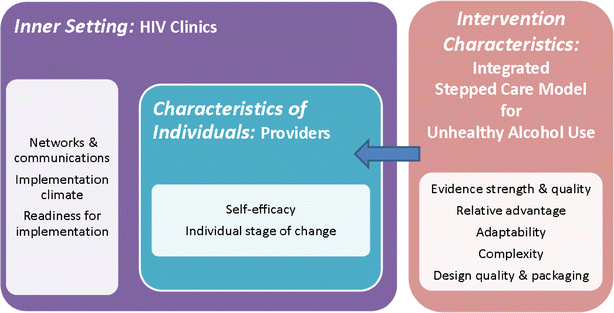Implementation of integrated stepped care for unhealthy alcohol use in HIV clinics
- PMID: 26763048
- PMCID: PMC4711105
- DOI: 10.1186/s13722-015-0048-z
Implementation of integrated stepped care for unhealthy alcohol use in HIV clinics
Abstract
Background: Effective counseling and pharmacotherapy for unhealthy alcohol use are rarely provided in HIV treatment settings to patients. Our goal was to describe factors influencing implementation of a stepped care model to address unhealthy alcohol use in HIV clinics from the perspectives of social workers, psychologists and addiction psychiatrists.
Methods: We conducted two focus groups with Social Workers (n = 4), Psychologists (n = 2), and Addiction Psychiatrists (n = 4) involved in an ongoing randomized controlled trial evaluating the effectiveness of integrated stepped care for unhealthy alcohol use in HIV-infected patients at five Veterans Health Administration (VA) HIV clinics. Data collection and analyses were guided by the Consolidated Framework for Implementation Research (CFIR) domains, with a focus on the three domains which we considered to be most relevant: intervention characteristics (i.e. motivational interviewing, pharmacotherapy), the inner setting (i.e. HIV clinics), and characteristics of individuals (i.e. the providers). A multidisciplinary team used directed content analysis to identify major themes.
Results: From the providers' perspective, the major implementation themes that emerged by CFIR domain included: (1) Intervention characteristics: providers valued tools and processes for facilitating patient motivation for treatment of unhealthy alcohol use given their perceived lack of motivation, but expressed a desire for greater flexibility; (2) Inner setting: treating unhealthy alcohol use in HIV clinics was perceived by providers to be consistent with VA priorities; and (3) Characteristics of individuals: there was high self-efficacy to conduct the intervention, an expressed need for more consistent utilization to maintain skills, and consideration of alternative models for delivering the components of the intervention.
Conclusions: Use of the CFIR framework reveals that implementation of integrated stepped care for unhealthy alcohol use in HIV clinics is facilitated by tools to help providers enhance patient motivation or address unhealthy alcohol use among patients perceived to be unmotivated. Implementation may be facilitated by its consistency with organizational values and existing models of care and attention to optimizing provider self-efficacy and roles (i.e. approaches to treatment integration).
Figures

Similar articles
-
The Starting Treatment for Ethanol in Primary care Trials (STEP Trials): Protocol for Three Parallel Multi-Site Stepped Care Effectiveness Studies for Unhealthy Alcohol Use in HIV-Positive Patients.Contemp Clin Trials. 2017 Jan;52:80-90. doi: 10.1016/j.cct.2016.11.008. Epub 2016 Nov 20. Contemp Clin Trials. 2017. PMID: 27876616 Free PMC article.
-
Local Implementation of Alcohol Screening and Brief Intervention at Five Veterans Health Administration Primary Care Clinics: Perspectives of Clinical and Administrative Staff.J Subst Abuse Treat. 2016 Jan;60:27-35. doi: 10.1016/j.jsat.2015.07.011. Epub 2015 Jul 26. J Subst Abuse Treat. 2016. PMID: 26297322
-
Implementing alcohol use disorder pharmacotherapy in primary care settings: a qualitative analysis of provider-identified barriers and impact on implementation outcomes.Addict Sci Clin Pract. 2019 Jul 10;14(1):24. doi: 10.1186/s13722-019-0151-7. Addict Sci Clin Pract. 2019. PMID: 31291996 Free PMC article.
-
Strategies to implement alcohol screening and brief intervention in primary care settings: a structured literature review.Psychol Addict Behav. 2011 Jun;25(2):206-14. doi: 10.1037/a0022102. Psychol Addict Behav. 2011. PMID: 21517141 Review.
-
Strategies to reduce HIV risk behavior in HIV primary care clinics: brief provider messages and specialist intervention.AIDS Behav. 2007 Sep;11(5 Suppl):S48-57. doi: 10.1007/s10461-006-9200-9. Epub 2007 Jan 5. AIDS Behav. 2007. PMID: 17205389 Review.
Cited by
-
Predictors of initiation of and retention on medications for alcohol use disorder among people living with and without HIV.J Subst Abuse Treat. 2020 Feb;109:14-22. doi: 10.1016/j.jsat.2019.11.002. Epub 2019 Nov 6. J Subst Abuse Treat. 2020. PMID: 31856946 Free PMC article.
-
Mapping Studies of Alcohol Use Among People Living with HIV/AIDS During 1990-2019 (GAPRESEARCH).AIDS Behav. 2023 Dec;27(12):3981-3991. doi: 10.1007/s10461-023-04112-1. Epub 2023 Jun 20. AIDS Behav. 2023. PMID: 37338623
-
The Starting Treatment for Ethanol in Primary care Trials (STEP Trials): Protocol for Three Parallel Multi-Site Stepped Care Effectiveness Studies for Unhealthy Alcohol Use in HIV-Positive Patients.Contemp Clin Trials. 2017 Jan;52:80-90. doi: 10.1016/j.cct.2016.11.008. Epub 2016 Nov 20. Contemp Clin Trials. 2017. PMID: 27876616 Free PMC article.
-
Interpersonal factors contributing to tension in the Chinese doctor-patient-family relationship: a qualitative study in Hunan Province.BMJ Open. 2020 Dec 10;10(12):e040743. doi: 10.1136/bmjopen-2020-040743. BMJ Open. 2020. PMID: 33303452 Free PMC article.
-
Practices, attitudes, and confidence related to tobacco treatment interventions in HIV clinics: a multisite cross-sectional survey.Transl Behav Med. 2022 Jul 7;12(6):726-733. doi: 10.1093/tbm/ibac022. Transl Behav Med. 2022. PMID: 35608982 Free PMC article.
References
-
- Galvan FH, Bing EG, Fleishman JA, London AS, Caetano R, Burnam MA, et al. The prevalence of alcohol consumption and heavy drinking among people with HIV in the United States: results from the HIV cost and services utilization study. J Stud Alcohol. 2002;63:179–186. doi: 10.15288/jsa.2002.63.179. - DOI - PubMed
Publication types
MeSH terms
Grants and funding
LinkOut - more resources
Full Text Sources
Other Literature Sources
Medical

